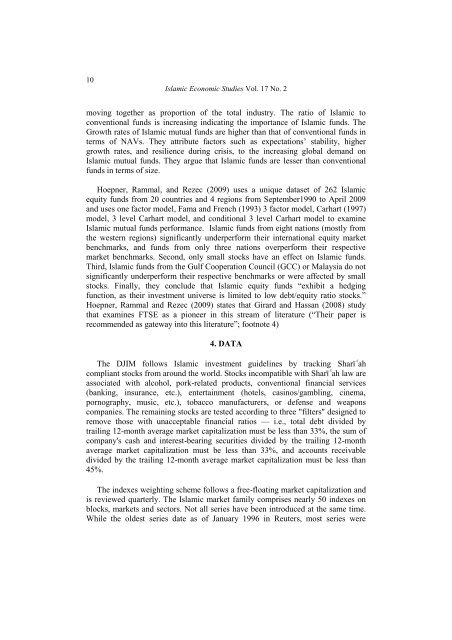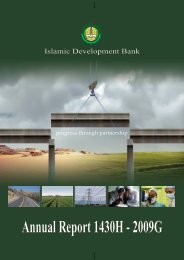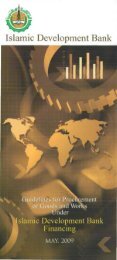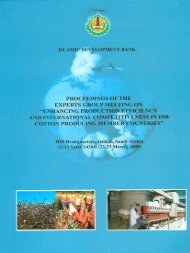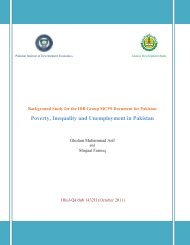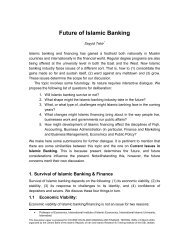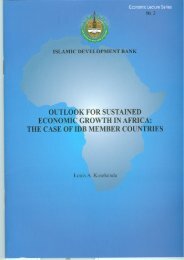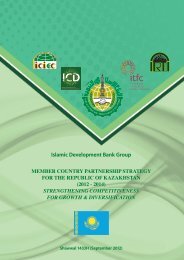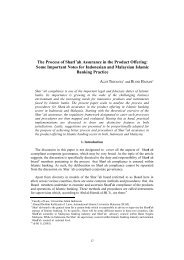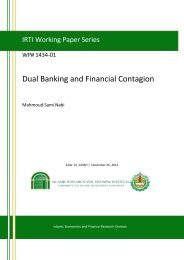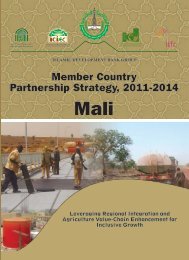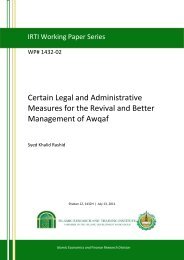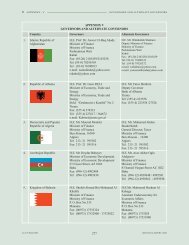faith-based ethical investing: the case of dow jones islamic ... - IRTI
faith-based ethical investing: the case of dow jones islamic ... - IRTI
faith-based ethical investing: the case of dow jones islamic ... - IRTI
- No tags were found...
You also want an ePaper? Increase the reach of your titles
YUMPU automatically turns print PDFs into web optimized ePapers that Google loves.
10Islamic Economic Studies Vol. 17 No. 2moving toge<strong>the</strong>r as proportion <strong>of</strong> <strong>the</strong> total industry. The ratio <strong>of</strong> Islamic toconventional funds is increasing indicating <strong>the</strong> importance <strong>of</strong> Islamic funds. TheGrowth rates <strong>of</strong> Islamic mutual funds are higher than that <strong>of</strong> conventional funds interms <strong>of</strong> NAVs. They attribute factors such as expectations’ stability, highergrowth rates, and resilience during crisis, to <strong>the</strong> increasing global demand onIslamic mutual funds. They argue that Islamic funds are lesser than conventionalfunds in terms <strong>of</strong> size.Hoepner, Rammal, and Rezec (2009) uses a unique dataset <strong>of</strong> 262 Islamicequity funds from 20 countries and 4 regions from September1990 to April 2009and uses one factor model, Fama and French (1993) 3 factor model, Carhart (1997)model, 3 level Carhart model, and conditional 3 level Carhart model to examineIslamic mutual funds performance. Islamic funds from eight nations (mostly from<strong>the</strong> western regions) significantly underperform <strong>the</strong>ir international equity marketbenchmarks, and funds from only three nations overperform <strong>the</strong>ir respectivemarket benchmarks. Second, only small stocks have an effect on Islamic funds.Third, Islamic funds from <strong>the</strong> Gulf Cooperation Council (GCC) or Malaysia do notsignificantly underperform <strong>the</strong>ir respective benchmarks or were affected by smallstocks. Finally, <strong>the</strong>y conclude that Islamic equity funds “exhibit a hedgingfunction, as <strong>the</strong>ir investment universe is limited to low debt/equity ratio stocks.”Hoepner, Rammal and Rezec (2009) states that Girard and Hassan (2008) studythat examines FTSE as a pioneer in this stream <strong>of</strong> literature (“Their paper isrecommended as gateway into this literature”; footnote 4)4. DATAThe DJIM follows Islamic investment guidelines by tracking Shar ahcompliant stocks from around <strong>the</strong> world. Stocks incompatible with Shar ah law areassociated with alcohol, pork-related products, conventional financial services(banking, insurance, etc.), entertainment (hotels, casinos/gambling, cinema,pornography, music, etc.), tobacco manufacturers, or defense and weaponscompanies. The remaining stocks are tested according to three "filters" designed toremove those with unacceptable financial ratios — i.e., total debt divided bytrailing 12-month average market capitalization must be less than 33%, <strong>the</strong> sum <strong>of</strong>company's cash and interest-bearing securities divided by <strong>the</strong> trailing 12-monthaverage market capitalization must be less than 33%, and accounts receivabledivided by <strong>the</strong> trailing 12-month average market capitalization must be less than45%.The indexes weighting scheme follows a free-floating market capitalization andis reviewed quarterly. The Islamic market family comprises nearly 50 indexes onblocks, markets and sectors. Not all series have been introduced at <strong>the</strong> same time.While <strong>the</strong> oldest series date as <strong>of</strong> January 1996 in Reuters, most series were


